|
Page 2 of 2
South Asian Women Leaders -
"accident of gender"
or "accident of birth"
by
Roopa Bakshi
(Cntd)
In a strongly patriarchal south Asian society, this pantheon
of women leaders, Stanley Wolpert feels, may be an "accident of
gender". Indira Gandhi was an only child, Benazir Bhutto and Chandrika
Kumaratunga are the eldest among siblings – the younger of
Benazir’s two brothers was found dead in his apartment in France, while
Murtaza, seen by many as a political heir to Zulfikar Bhutto, was
assassinated in Karachi a few years ago; Hasina Wajed is the sole survivor
of a family that was massacred; Chandrika Kumaratunga’s younger brother
Anura Bandaranaike, unable to deflect his older sister from her political
ambitions, joined the Opposition. Sirimavo Bandaranaike and Khalida Zia -
were housewives at the time of their personal tragedies, and did not have
children old enough to be seated in their father’s office.
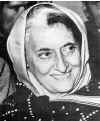 When
Indira Gandhi (1917–1984) first became the Prime Minister of India in
1966, she was 49 years old, had a fine political pedigree, and also a track
record of 28 years of close association with the Congress (she had been a
member of the Working Committee and also the President of the party); she
had served on various Boards and had also headed a Ministry. In retrospect,
even these credentials are not enough for the Prime Minister’s Office - it
is wisdom and vision that matter. Many groups and Governments were alienated
by her myopic policies, not least by her younger son Sanjay, who was feared
for his muscle-flexing bully-politics. When
Indira Gandhi (1917–1984) first became the Prime Minister of India in
1966, she was 49 years old, had a fine political pedigree, and also a track
record of 28 years of close association with the Congress (she had been a
member of the Working Committee and also the President of the party); she
had served on various Boards and had also headed a Ministry. In retrospect,
even these credentials are not enough for the Prime Minister’s Office - it
is wisdom and vision that matter. Many groups and Governments were alienated
by her myopic policies, not least by her younger son Sanjay, who was feared
for his muscle-flexing bully-politics.
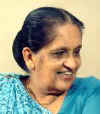 Sirimavo
Bandaranaike passed away in October 2000, in Colombo. She had just finished
serving her third term as Prime Minister – this time under her daughter
President Chandrika Kumaratunga. Sirimavo
Bandaranaike passed away in October 2000, in Colombo. She had just finished
serving her third term as Prime Minister – this time under her daughter
President Chandrika Kumaratunga.
Sirimavo
Bandaranaike came from an influential family of Sri Lanka, studied at St.
Bridget’s Convent in Colombo, married Solomon Bandaranaike, raised a
family, and her life was devoted to her role as a mother and a wife. Her
husband became the Prime Minister of Ceylon (now Sri Lanka) in 1956 and
three years later, in 1959, was killed by a Buddhist monk. Sirimavo stepped
into her husband’s shoes, aged 44. Her first two terms as Prime Minister
were marked by unpopular policies that alienated the country’s minority
groups, led to ethnic strife and dissension, and also economic stagnation. In 1980 the Parliament barred her from political office but was pardoned six
years later.
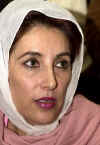 Benazir
Bhutto was 24 years old when General Zia staged a coup, imprisoned her
father Zulfikar Bhutto, and executed him in 1979. Benazir and her mother
Nusrat Bhutto were put under house arrest, later imprisoned for a while.
Benazir spent 5 years in detention. Educated at Radcliffe and Oxford,
Benazir won the 1988 elections. She had the nation’s goodwill but her
focus remained misdirected. She was dismissed 20 months later on charges of
incompetence and corruption. Benazir came back to Benazir
Bhutto was 24 years old when General Zia staged a coup, imprisoned her
father Zulfikar Bhutto, and executed him in 1979. Benazir and her mother
Nusrat Bhutto were put under house arrest, later imprisoned for a while.
Benazir spent 5 years in detention. Educated at Radcliffe and Oxford,
Benazir won the 1988 elections. She had the nation’s goodwill but her
focus remained misdirected. She was dismissed 20 months later on charges of
incompetence and corruption. Benazir came back to
power in 1993 and there was little or no change in her agenda.
She was once again dismissed on accusations of corruption. Her husband Asif
Zardari is in prison on charges of corruption, she is estranged from her
mother, her brother Murtaza was assassinated in Karachi in 1996 – a heavy
price to pay for lust of power.
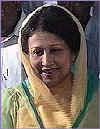 Bangladesh’s
first woman Prime Minister, Khalida Zia, had led a quiet existence, married
to General-turned-President Zia Ur Rahman, and was totally involved in
raising their two sons. In 1981 rebel military officers gunned down her
husband. She got inducted into politics and a decade later won the election
to the Prime Minister’s Office. Five years later she lost to Hasina Wajed,
daughter of Bangladesh’s first Prime Minister Mujibur Rahman, who was
assassinated in 1976. Bangladesh’s
first woman Prime Minister, Khalida Zia, had led a quiet existence, married
to General-turned-President Zia Ur Rahman, and was totally involved in
raising their two sons. In 1981 rebel military officers gunned down her
husband. She got inducted into politics and a decade later won the election
to the Prime Minister’s Office. Five years later she lost to Hasina Wajed,
daughter of Bangladesh’s first Prime Minister Mujibur Rahman, who was
assassinated in 1976.
 Hasina
Wajed was in Germany with her nuclear physicist husband when a group of four
young army officers stormed into her father Mujibur Rahman’s house in
Dhaka and killed all members of the household, including Mujibur Rahman’s
young grandchildren. The lone survivor of Mujibur Rahman’s family, Hasina
Wajed was the natural choice for her father’s party leadership. She lost
the election to Khalida Zia in 1991 but defeated her in the following
elections in 1996 to become the country’s Prime Minister. Hasina
Wajed was in Germany with her nuclear physicist husband when a group of four
young army officers stormed into her father Mujibur Rahman’s house in
Dhaka and killed all members of the household, including Mujibur Rahman’s
young grandchildren. The lone survivor of Mujibur Rahman’s family, Hasina
Wajed was the natural choice for her father’s party leadership. She lost
the election to Khalida Zia in 1991 but defeated her in the following
elections in 1996 to become the country’s Prime Minister.
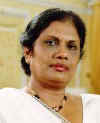 Chandrika
Kumaratunga, the current President of Sri Lanka, is the daughter of two
Prime Ministers – Solomon and Sirimavo Bandaranaike. Born into a
privileged family, Chandrika was educated in Sri Lanka and later studied
Political Science at the University of Paris. Her husband, an actor and an
aspiring politician, was killed in 1988, and it was after his death that
Chandrika Kumaratunga rejoined her mother's party that won the parliamentary
elections of August 1994. Only six years after her formal foray into
politics, Chandrika, aged 49, first became Prime Minister in 1994, and then,
in November of that year, she won the presidential election. She appointed
her mother, Sirimavo Bandaranaike, to serve as Prime Minister in her new
government. The ongoing
ethnic crisis that arose during her mother’s tenure, has
cost the country heavily in terms of its people, productivity and resources. Chandrika
Kumaratunga, the current President of Sri Lanka, is the daughter of two
Prime Ministers – Solomon and Sirimavo Bandaranaike. Born into a
privileged family, Chandrika was educated in Sri Lanka and later studied
Political Science at the University of Paris. Her husband, an actor and an
aspiring politician, was killed in 1988, and it was after his death that
Chandrika Kumaratunga rejoined her mother's party that won the parliamentary
elections of August 1994. Only six years after her formal foray into
politics, Chandrika, aged 49, first became Prime Minister in 1994, and then,
in November of that year, she won the presidential election. She appointed
her mother, Sirimavo Bandaranaike, to serve as Prime Minister in her new
government. The ongoing
ethnic crisis that arose during her mother’s tenure, has
cost the country heavily in terms of its people, productivity and resources.
 More
recently, Sonia Gandhi, wife of the assassinated leader and former Prime
Minister of India, Rajiv Gandhi, was elected to the Office of the President
of the Congress party, which also makes her the leader of the Opposition.
Sonia shied away from politics for a long time, devoting herself to her
children - Rahul and Priyanka - but eventually succumbed to the pressures of
the Party stalwarts who needed a 'man' to keep the fortunes of the party
together. Her mother-in law Indira Gandhi was often referred to as the
"only man in her Cabinet." More
recently, Sonia Gandhi, wife of the assassinated leader and former Prime
Minister of India, Rajiv Gandhi, was elected to the Office of the President
of the Congress party, which also makes her the leader of the Opposition.
Sonia shied away from politics for a long time, devoting herself to her
children - Rahul and Priyanka - but eventually succumbed to the pressures of
the Party stalwarts who needed a 'man' to keep the fortunes of the party
together. Her mother-in law Indira Gandhi was often referred to as the
"only man in her Cabinet."
Unlike women leaders and Prime Ministers elsewhere, the
existing south Asian pantheon has not risen from the political ranks, nor
have they any work experience in any sector of the economy. Margaret
Thatcher, became the Prime Minister of Great Britain after 27 years of work
experience. She had worked as a research chemist and a tax lawyer
before she joined the Conservative Party. When she got elected to the
Parliament, she was still a long way from 10 Downing Street – it would
take her another twenty years to get there. Similarly Golda Meir, Israel’s
Prime Minister (1969-74), spent forty odd years working hard for various
organisations and working her way to the top through sheer devotion and
dedication. They were neither wives nor dynastic daughters.
Democratic institutions evolve with vision, hard work and
foresight of wise leaders – and leadership is not created overnight.
People brought in for emotional reasons interrupt and halt the democratic
process, and at times have easily undermined democratic institutions. The
quest, and consequent, lust for power is not gender specific. Corruption and
insatiable ambition are the hallmark of many a leader in the south Asian
region – man or woman. South Asian women need to change this record of
political inheritance. There are among them, many who are talented and
politically gifted to enter the political arena on their own merit. Asma
Jahangir of Pakistan maybe one of them.
__________________________
Disclaimer |






